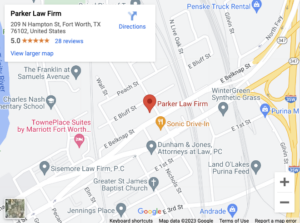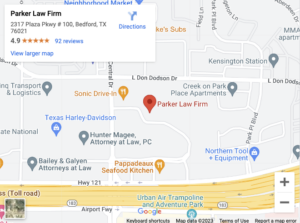
Whiplash is one of those injuries many people don’t take seriously until they experience it themselves. You’re not dealing with any broken bones, and you’re not cut or bleeding. After an accident, you might only initially feel a little soreness in your neck. However, whiplash can cause unexpected problems in the days after the accident, and if you ignore it, it can get worse.
Technically, whiplash is a neck injury caused by a sudden back-and-forth motion, kind of like the movement made when cracking a whip. That’s where the name comes from. It’s most often seen in rear-end car crashes, but it can happen in any vehicle accident while playing sports when you slip and fall or in just about any scenario where there’s a sudden impact.
The problem is that a lot of people walk away from crashes in Fort Worth thinking they’re fine. Then, the headaches start, and the neck stiffness creeps in. Maybe it’s hard to sleep or concentrate. Whiplash isn’t just a little bit of neck pain. It can affect your whole life — your job, relationships, and ability just to get through the day.
Symptoms of Whiplash

Whiplash typically doesn’t show up immediately after an accident. Some symptoms don’t show up for hours or even days. That’s why it can be tough for people to connect their neck pain to the accident that caused it.
If you’re suffering from whiplash, you might notice:
- Pain or stiffness in your neck or shoulders
- Headaches, especially at the base of the skull
- Dizziness
- Fatigue
- Tingling or numbness in your arms
- Trouble focusing
- Memory issues
- Sleep disturbances
Symptoms can be more than physical, too. Whiplash can lead to anxiety and depression, especially when the pain refuses to go away. If you can’t work or do the things you used to do, it quickly wears you down.
Rear-end accidents are common in Fort Worth, especially with all the busy highways in the area, like I-35W and Loop 820. Whiplash is often the result of these crashes, even in the ones that don’t seem that bad on the surface.
How Whiplash Impacts Your Daily Life
Imagine you wake up the day after your accident to find you can’t turn your head without pain. Try driving to work like that or sitting at a computer for eight hours. You might even have trouble sleeping if you can’t find a position that’s comfortable for your head and neck.
It doesn’t stop there. You could end up missing work because of the pain, and that means smaller paychecks. Hospital bills pile up. You might need physical therapy, medications, or even mental health support if the stress gets to be too much. All of this adds up quickly and can drain you physically, emotionally, and financially.
The Hidden Cost of Ignoring Whiplash
Too many people brush off whiplash because it doesn’t seem like a big deal. They try to tough it out and hope it just goes away on its own. Sometimes, it does get better, but more often than not, it doesn’t. And when it doesn’t, the pain can take over everything.
That’s when the medical costs pile up, and people lose time at work. Insurance adjusters start to play games, offering lowball settlements and dragging things out until you get tired of the fight and give up.
Ignoring the pain puts both your health and your legal rights at risk. It could take longer to heal, or you could be left with permanent issues like chronic pain or degenerative disc disease. If you end up filing a personal injury case, the delay in treatment can lead to the insurance company reducing or outright denying your claim.
Why Whiplash Can Be Hard To Prove
Whiplash is one of those injuries that doesn’t show up on scans. X-rays and MRIs usually come back clean. That doesn’t mean nothing’s wrong. It just means there’s no easy way to confirm it. Doctors often have to rule out anything serious and then go by what the patient says. And because there’s no visible damage, people might assume you’re okay when you’re not.
That invisibility can work in the insurance company’s favor. If there’s nothing concrete to point to, they may question whether the injury is real or suggest it came from something else. It’s not uncommon for them to argue that the pain is being overstated.
That’s part of what makes whiplash so frustrating. You’re in pain and dealing with medical bills and doctor’s appointments, and now, you have someone questioning your experience. That’s both unfair and exhausting.
Take the First Step Toward Getting What You Deserve
Whiplash can flip your life upside down in unexpected ways, but you don’t have to face them alone. If you’re hurting after a crash in Fort Worth, Parker Law Firm Injury Lawyers is ready to help. Don’t let insurance downplay your pain. Call us today to get the support you need to move forward.
Protect Your Rights And Start Your Recovery Journey
If you or a loved one has been in an accident in Fort Worth and are now dealing with the aftermath of a chest injury, you have legal options. Parker Law Firm Injury Lawyers are here to guide you through the process and help you get the compensation you’re entitled to.
Contact our office today at Parker Law Firm Injury Lawyers at (817) 503-9200 to set up a free consultation of your case. Let us take the legal burden off your shoulders so you can focus your energy on your recovery.
Other Resources
- Appeal
- Breach of Duty
- Burdon of Proof
- Car Accident Settlement Timeline
- Causation
- Contributory Fault
- Chest Injury
- Defendant
- Economic Damages
- Is It a Mistake to Admit Fault After a Car Accident in Fort Worth, TX?
- Insurance Adjuster
- Liability
- Negligence
- Negotiation
- Non-Economic Damages
- Punitive Damages
- Property Damages
- Quality of Life
- Six Questions to Ask a Personal Injury Lawyer During a Free Consultation
- Spinal Cord Injuries
- What Is a Contingency Fee?
- What is a Personal Injury Case?
- What Is a Third Party?
- What Is Evidence?
- What Is PIP?
- What Should I Do if Someone Sues Me After a Car Accident in Texas?
- When Should I Hire a Fort Worth Personal Injury Lawyer?
- Whiplash Injury
- How Are Pain and Suffering Damages Calculated in Texas?
- Types of Damages Available in Texas Personal Injury Cases


